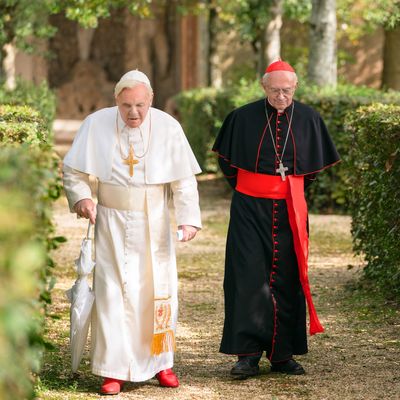
As the poet once wrote, when you’re a pope, you’re a pope all the way. Popes do not, traditionally, retire — they remain in the role until they die, which is why it came as such a shock to Catholics around the world when, in 2013, Benedict XVI announced that he would be stepping down from his place in the church’s highest position. Benedict XVI, born Joseph Aloisius Ratzinger in Marktl, Germany, became the first pope in almost 600 years to retire, and he cited his health, his “lack of strength of mind and body,” as his reason. The Two Popes presumes there’s more to the story, and it has the good taste to recruit two acting greats with which to explore this odd moment in recent religious history. One of those talents is Anthony Hopkins, who plays Ratzinger, and the other is Jonathan Pryce, who takes the role of the current Pope Francis, then Cardinal Jorge Mario Bergoglio of Buenos Aires.
That both these actors are British speaks to a certain plummy biopic tradition to which the film belongs. The Two Popes was written by Anthony McCarten, who also wrote the scripts for The Theory of Everything, Darkest Hour, and Bohemian Rhapsody, this time adapting from a play he wrote in 2017. McCarten has made a career out of sanding down complicated figures into the smoother stuff of Oscar-ready impersonations, but The Two Popes doesn’t feel quite as oppressively neat as his other projects. There are scenes delving into Bergoglio’s formative years as a younger man (when he’s played by Juan Minujín), and they’re definitely the film’s most dutiful stretches. But they’re helped along by the irregular rhythms they’re given by director Fernando Meirelles (of City of God fame), who treats the flashbacks as messy memories rather than direct solutions to questions of the character’s present-day behavior.
He treats them, in other words, as accessories to what’s primarily a series of conversations between the two men. A series of duels between them, sometimes, about the nature of their faith, and the future of the organization to which they’ve devoted their lives. Ratzinger is the conservative, the hard-liner who holds fast to doctrine and resists change, who stands on ceremony and insists on speaking in Latin, especially when he has to deliver difficult news. Bergoglio is the reformer, who renounces luxury to live simply and gives Communion to the divorced, who speaks out against climate change and up in favor of refugees and the poor. In order to break up the inherently theatrical talkiness of this setup, there are sequences of the papal conclaves and of Bergoglio back in Argentina. But the talkiness is really where it’s at, and The Two Popes, a perfectly good film, would have been a better one if it had stripped itself down to those essentials and started with Bergoglio arriving at the embattled Ratzinger’s summer residence to ask him for permission to resign, something Ratzinger reads as an act of protest.
The sometimes testy, sometimes congenial conversations they have — wandering in the garden, trying to relax after dinner, communing in the Sistine Chapel and then having a snack in its sacristy — are grand ones. They are, after all, the soon-to-be-past and eventually-to-be-future heads of the church arguing over its obligations to change with the times and its terrible failures with regard to its dealings with abuse. But they’re also intimate, two men discussing their own capacity for leadership in ways that resonate beyond the religious. “Whenever I try to be myself, people don’t seem to like me very much,” Ratzinger confesses after watching the likable Bergoglio in action, and Hopkins delivers this line as a joke that collapses into revealing vulnerability. Bergoglio, meanwhile, doesn’t feel he passes muster because of his history with attempting to appease the military dictatorship in the ’70s, when two of his priests were kidnapped and tortured.
The characters have opposing temperaments in addition to viewpoints — one reserved and solitary, the other effusive and outgoing — and Hopkins and Pryce hold their conversations in flurries, as the men clash or reach a rapport, and then back away. Pryce has the showier role, but it’s also the trickier one, because the film is fond of the future pope to the point of being overly sunny and blurring over the less liberal aspects of Catholic dogma that the actual pope maintains. Pryce provides the warmth, but he’s playing a character who gets treated as having one foot in the adorably secular and the other in sainthood. It’s Hopkins who gives the film its humanity as the solitary Ratzinger, playing him as a man who’s gotten to the place he’s seemingly been working toward all his life, only to find himself abandoned by God. “For my entire life, I have been alone — but never lonely until now,” he says, and it’s as heartbreaking a line as it is an unlikely actual one. The Two Popes may be a fantasy about a closed institution flinging its doors open, but it’s also a compelling actor’s showcase. The combination is surprisingly potent.


